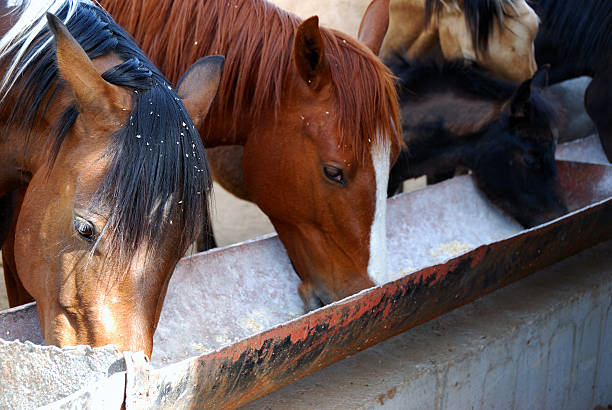Key Takeaways:
- Forage should be the basis of every equine diet; horses require at least 1% of their body weight (BW) in hay everyday.
- Concentrate meals should not exceed 0.5% of a horse’s BW.
- Long stem forage is essential for hindgut health.
- Protein should be fed in a form that will be digestible in the small intestine, such as in a grain mix.
- Improper feeding can easily lead to problems such as gastric ulcers, colic, and laminitis.
Horses have a special digestive tract that has developed for their natural lifestyle: grazing small amounts of food almost constantly throughout the day. It is important to feed horses according to their unique digestive anatomy in order to optimize overall health.
But how exactly do we do that?
How much hay to feed a horse
First, it is always important to remember that hay should be the primary component of any horse’s nutrition plan.
Horses require a MINIMUM of 1% of their BW per day to be provided as forage. Many can even meet all of their nutrient requirements based on good quality hay alone, however, if they were eating a diet of solely grass and hay, they would consume closer to 2-3% of their weight each day.
Concentrate meals and any other supplements should be considered just that: supplemental to the forage basis of their diet.
How much grain to feed a horse
Horses have a very small stomach, which can only hold a MAXIMUM of 1% of their BW at a time.
However, it is recommended that you only feed a horse a concentrate meal that is 0.5% of their body weight.
Small meals are crucial in order to not overwhelm the capacity of the stomach. If the stomach does become overwhelmed, it will push digesta through to the small intestine too quickly and without the proper extent of digestion.
Additionally, the stomach is constantly secreting acid, and acid secretion into an empty stomach between large meals may lead to the development of ulcers. Feeding horses in continuous small meals as frequently as possible is the best way to aid in buffering stomach acid.
The small intestine is where digestion and absorption of simple carbohydrates, like sugars and starches, proteins, and some fats occurs.
It is important to capitalize on the fact that horses can directly absorb protein in the small intestine by providing high quality protein in a form that is available for digestion in the small intestine, such as in a grain. Similarly to the stomach, if the horse is fed too much at once they will pass digesta that has not been fully digested in the small intestine into the large intestine.
The large intestine is where horses share similarities to cattle. They have an extensive large intestine that serves as a fermentation vat full of good gut bacteria. These bacteria are able to break down feedstuffs that the horse’s body cannot, like cellulose and other complex carbohydrates.
This is why the horse is able to obtain so many nutrients from grass and hays; The end products produced by microbial fermentation can be used by the animal as sources of energy.
In order to maintain a healthy microbiome and large intestine, the horse needs an adequate amount of long stem hays. If a horse is fed large meals, especially large grain meals, all at once and digesta is pushed through the stomach and small intestine without full digestion, fermentation of sugars and starches can cause an acidic environment and change the microbial population, which can lead to digestive issues and laminitis.
Your horse’s diet requirements
Overall, horses should be fed frequent and continuous small meals. Forage should compose the main portion of a horse’s diet, with grain considered as supplemental to fill any holes in their nutrition program.
Make sure you feed hay before grain. If you feed both at the same time, a horse will naturally choose grain first, and then move on to hay. When this happens, the hay will push the grain through the GI tract too quickly and cause it to end up in the large intestine where fermentation can be detrimental to health.
Again, feed hay BEFORE grain to allow nutrients to reach their optimal destinations within the horse digestive tract.
Improper feeding management may lead to digestive issues; however, a correct nutrition program can promote gut health and overall wellness in your horse.

